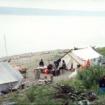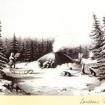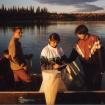Following the signing of the Gwich'in Comprehensive Land Claim Agreement in 1992, the Gwich'in Tribal Council (GTC) established a number of organizations to deal with new responsibilities created by the agreement. The Gwich'in Social and Cultural Institute (GSCI) was established as the cultural and heritage arm of the GTC in response to concerns about the decline of Gwich'in culture and language and the need to implement heritage resource issues identified in the land claim Legislation and Policy. In the fall of 1993, the Institute began operation with the mandate to 'document, preserve and promote Gwich'in culture, language, traditional knowledge and values.'
From September 1993-March 2016, the GSCI operated as a non-profit society with registered charitable organization status and was governed by a seven member Board of Directors composed of representatives from the four Gwich'in communities and the Gwich'in Tribal Council. The objective of the Institute was to conduct research in the areas of culture, language and traditional knowledge so that this body of knowledge would be recorded and available for future generations and the development of programs appropriate for Gwich'in needs. This was believed essential in building new awareness of, and pride in, Gwich'in culture.
On April 1, 2016, the GSCI became a department under the Gwich'in Tribal Council called, the Department of Cultural Heritage. The Department's mandate continues and staff continue to work with the four communities of Aklavik, Fort McPherson, Inuvik, and Tsiigehtchic which all fall within the Gwich'in Settlement Area (GSA), established by the land claim agreement. The Institute also continues to carry out heritage research in the Yukon in traditionally used areas described as the Primary and Secondary Use Areas in the claim. (Map of Settlement Region)
The GTC Department of Cultural Heritage has offices in Tsiigehtchic, Fort McPherson and Yellowknife.



